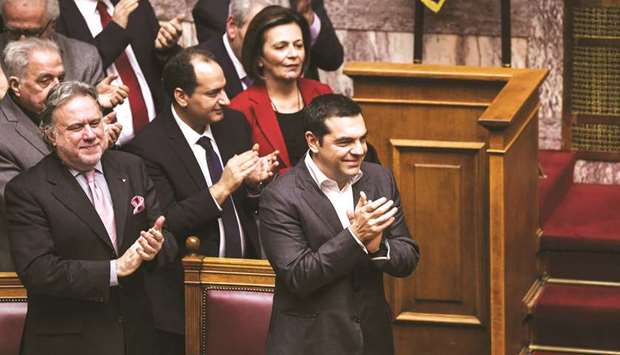Prime Minister Alexis Tsipras has been implementing his re-election strategy to the letter over the past six months, steering Greece out of a humiliating bailout and resolving a decades-old dispute with neighbouring Macedonia.
So far, it isn’t paying off.
With a general election no more than eight months away, his Syriza party is far behind in opinion polls.
That is despite two signature projects since last summer, evidence that the economy is climbing out of years of depression and willingness at last among investors to lend.
Tsipras was elected as a firebrand leftist in 2015 on a promise to reject the austerity required in the bailout.
He later caved in to the lenders’ demands and has reinvented himself as a conformist.
Now, after years of austerity many ordinary voters cannot afford to keep the lights on, others are deeply indebted, and almost one in five Greeks is unemployed.
“Our debt is huge and it’s still growing, unemployment is still very high,” said 30-year-old Athens resident Panagiotis, an environmentalist who works in the private sector.
“The crisis isn’t over. That’s a lie, we are not fools.”
Sources close to the prime minister say his strategy is only now reaching the point where his government can deliver on its pre-election promises and make amends for bailout pain — a plan he says aims at “fair growth”. Creditors released Greece from its third bailout in August, putting it back on the path to full financial independence.
Tsipras has since used greater fiscal freedom to scrap further pension cuts, cut property and corporate taxes and ease some social security contributions.
He raised the minimum wage for the first time in a decade, by 11%. He also wants to extend a reduced value-added tax regime for five islands with huge migrant arrivals in past years, and to make it easier for people to pay off pension-fund arrears and bank loans, government officials said.
Tsipras aims to hire thousands of public-sector workers by 2020 as well as making constitutional reforms to separate the Greek Orthodox Church clearly from the state, important to left-wing voters.
Moves are also under way to extend Greece’s western maritime boundaries to 12 miles offshore from six, two officials said.
This could smooth some nationalist feathers ruffled over Macedonia and enable the creation of exclusive economic zones surrounding Greece, Albania and Italy.
The latest poll by Metron Analysis, for To Vima newspaper, puts Syriza 12 points behind the conservative New Democracy, whose leader Kyriakos Mitsotakis promises to ease tax and social contributions for businesses and boost investment.
The government aims to shrink that gap before European Parliament elections in May, Tsipras’ first official popularity test since winning power.
Analysts say he may opt for a snap vote if the gap keeps widening, though he has repeatedly ruled that out.
His term expires in October.
“We want to showcase that Greece has returned to normality,” one of the government officials said. “The aim is to shrink the gap in the EU election to be able to win a national vote later in the year.”
His government has a razor-thin majority in parliament, beating a censure motion last month by a single vote with support from independent lawmakers, after his right-wing coalition ally resigned over the Macedonia name accord.
The neighbouring ex-Yugoslav state agreed to rename itself North Macedonia to ease Greek fears that the old name implied a sovereignty claim over its northern province of Macedonia.
The deal proved unpopular for Tsipras at home, where tens of thousands of protesters condemned his decision to sanction the continued use of the word Macedonia.
However, the deal appears to have won him respect from the European Union, Greece’s major bailout creditor.
It opens the way for the EU to start accession talks with the Balkan state and continue the bloc’s expansion eastward.
The question now is whether Tsipras has built up enough goodwill with EU partners to further loosen the purse strings to win over voters.
Despite the end of the bailout, Athens has agreed to meet specific surplus targets, tied to potential debt relief.
Its lenders are also monitoring its progress to decide whether to disburse millions of euros in bond profits.
Eurozone officials note that although Greece is expected to exceed its fiscal targets this year its reform progress is low.
Tsipras’ cabinet applauded him when he announced the minimum wage raise last week, but a meeting of eurozone deputy finance ministers gave it a cooler reaction a few days later.
“The atmosphere was not very positive,” said a eurozone official.
“Greece is moving back in many areas. The general political feeling is of course positive about Tsipras and what he did about Macedonia, but this is not the markets, you cannot trade one thing for the other.”
One eurozone official said a late February progress report on Greek reforms “did not look good”. A negative EU report could unnerve markets — destabilising another plank of Tsipras’ re-election strategy: the need for calm financial markets.
Greece successfully tapped bond markets with a five-year bond last week, its first issue post-bailout, and plans more bond issues this year.
“There is a fine line that Greece needs to make sure it doesn’t cross,” said associate director at IHS Markit Economics Diego Iscaro.”Markets understand it’s a pre-election period but Athens needs to build a post-bailout reputation of reforms.”

File photo of Greek Prime Minister Tsipras celebrating after the voting session on the agreement aimed at ending a 27-year bilateral row by changing the name of Macedonia to the Republic of North Macedonia, at the Greek Parliament, in Athens.
